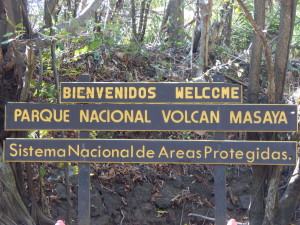 On Sunday we took a short trip to the Masaya Volcano which is just 20 kilometers (about 12.5 miles) outside of Managua. The area actually includes two volcanoes and five craters. The Masaya Volcano is also known as Popogatepe (“mountain that burns”) in the language of the indigenous Chorotega tribe. The Masaya Volcano, during pre-Columbian times, was sacred to the indigenous people and they believed the eruptions were signs the gods were angry. To appease the gods, they would offer sacrifices of small children and maidens. In the 16th century, the Spanish conquerors baptized the active volcano “La Boca del Infierno” or “The Mouth of Hell” and for good reason. Gases constantly escape from the throat of the volcano and iridescent lava can be seen in its interior. The Spanish planted a cross on the edge of the caldera to exorcise the devil from it. It is an active volcano and it’s last eruption was in 2008. In 4550 B.C. one of the largest volcanic eruption on Earth in the last 10,000 years occurred here. Unfortunately, looking down the throat of an active volcano is on Heide’s Bucket List. Somehow the fact that it’s not on mine is irrelevant so off we went.
On Sunday we took a short trip to the Masaya Volcano which is just 20 kilometers (about 12.5 miles) outside of Managua. The area actually includes two volcanoes and five craters. The Masaya Volcano is also known as Popogatepe (“mountain that burns”) in the language of the indigenous Chorotega tribe. The Masaya Volcano, during pre-Columbian times, was sacred to the indigenous people and they believed the eruptions were signs the gods were angry. To appease the gods, they would offer sacrifices of small children and maidens. In the 16th century, the Spanish conquerors baptized the active volcano “La Boca del Infierno” or “The Mouth of Hell” and for good reason. Gases constantly escape from the throat of the volcano and iridescent lava can be seen in its interior. The Spanish planted a cross on the edge of the caldera to exorcise the devil from it. It is an active volcano and it’s last eruption was in 2008. In 4550 B.C. one of the largest volcanic eruption on Earth in the last 10,000 years occurred here. Unfortunately, looking down the throat of an active volcano is on Heide’s Bucket List. Somehow the fact that it’s not on mine is irrelevant so off we went.
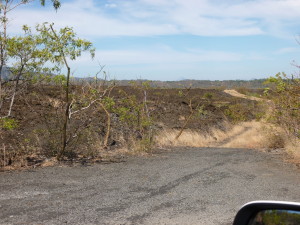
We decided to leave early (about 8:30 a.m.) as the park opens at 9:00 a.m. and we wanted to get ahead of the afternoon heat. The heat of the day combined with the heat from the volcano itself was something we wanted to avoid. We arrived 2 minutes before the park opened and were able to get in quickly. The cost for Nicaraguan residents is but C$30 (about $1.07 US); for non-residents the cost is C$100 ($3.57 US)–very reasonable. The guard at the gate wrote down our license plate number and they checked us off as we left the park later. I’m sure they need to keep track of people inside a park where you can be cooked alive ! The road up the mountain side was quite good by Central American standards. It was paved (kind of) most of the way and had a speed limit of 40 KMH which you could actually do.
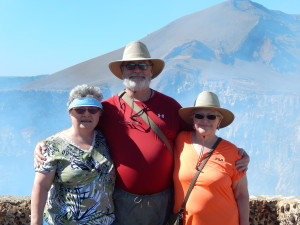
As we drove up the mountain side we were directed to the Visitors Center. A stop here is mandatory before you are permitted to enter the road up the volcano. There is a small museum of pictures, descriptions, fauna and flora, along with the opportunity to buy things at the gift shop–perhaps the real reason for the mandatory stop. There is a walk-through display that provides examples of animals, insects, flowers and other vegetation that lives and grows on the slopes of the volcano. Bats live in caves that are down inside the caldera and the nightly migration from the caves is supposed to be pretty spectacular. Also, parrots amazingly live inside the caldera and have somehow managed to adapted to the sulfur smoke gases escaping from the volcano. They return to their roost each evening around dusk. Unfortunately, the night-time tours have been temporarily suspended with no explanation. We will keep checking to see if they restart them during our stay.
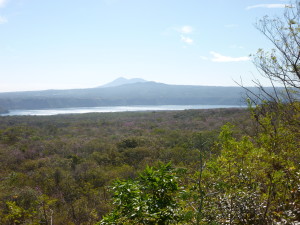
In any case, the view from the visitors center is pretty spectacular in itself. From the outside deck you can see Laguna de Masaya, a large volcanic lagoon. As we drove from the Visitors Center to the top of the volcano, the panoramic views were breathtaking. It is 635 meters (2,083 feet) above sea level. From that height, I have no doubt we were seeing all the way to Pennsylvania!!! But the real treat was still to behold. As we got closer to the top of the volcano one could see the smoke and gases escaping like Mount Doom from Lord of the Rings. I have no doubt that Sauron’s Palantir (crystal ball) was watching us the entire way and he had our approach on his big screen.
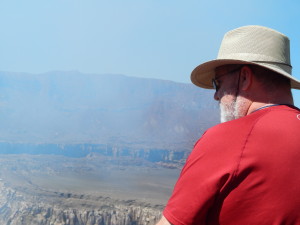
But the best was yet to come. There are simply not words to describe the awe inspiring view of an active volcano up close and personal. Although we could not see the glow of the lava during the daylight hours, the sulphur gases and smoke escaping gave proof of what lies below. In the picture to the left, I am standing at a railing on the edge of the cliff with the mouth of the volcano directly below me. You can literally look straight down into the abyss. In the larger realm of the universe, one comes face-to-face with how truly insignificant we are while glimpsing at our own mortality.
————————————————————————————————————–

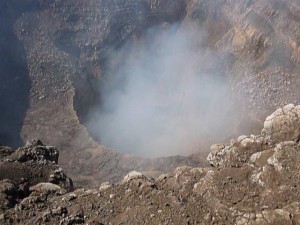
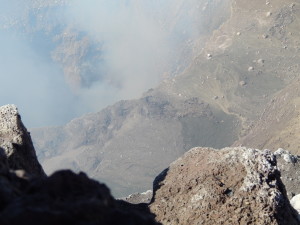
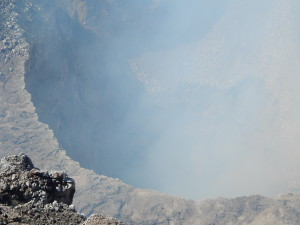
All I can say is WOW..
I have an increasing respect for the power and wonder of Mother Nature…
Awesome!